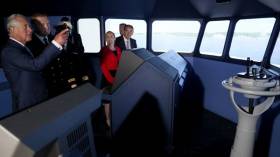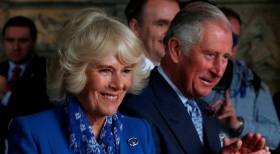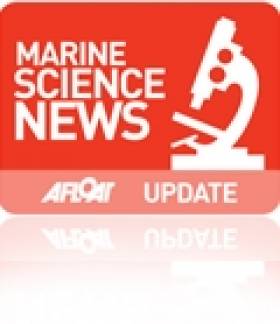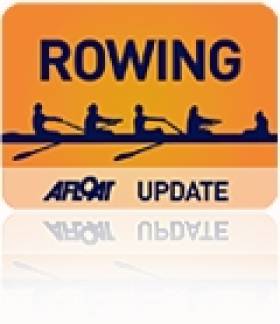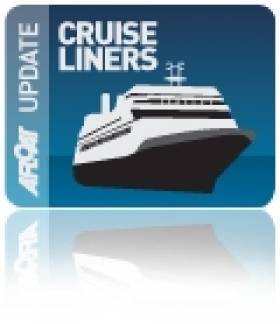Displaying items by tag: Prince of Wales
#NavyNews - On visit to Cork Harbour writes the Irish Examiner, the Prince of Wales discovered that piloting a ship is like riding a bike – you never lose the knack.
More than 40 years after he commanded a British warship during his Royal Navy days he returned to the bridge – albeit a simulator with a very realistic 180-degree projection of the sea.
Charles, who captained the mine hunter HMS Bronington for 10 months in 1976, joined naval students at the National Maritime College of Ireland (NMCI) near Cork for the trip down memory lane.
At first, Lieutenant Gavin McCarthy, a navigation instructor, called out the manoeuvres for the ship WB Yeats which Charles repeated for those training for a career on the seas.
WB Yeats – a mock-up of a real off-shore patrol vessel – was in waters off the town of Cobh, famous for being the last port of call for the Titanic before it set off on its ill-fated journey.
Charles marvelled at the scene in front of him which gave a real-time feel to the movement of the ship, especially when stormy waters were introduced with the click of a mouse and he said “it’s extraordinary” as the projection outside the windows appeared to make the ship move up and down over the waves.
For further reading of the historic visit to the naval base, click here.
Visit by Prince Charles to Include Former British Navy Base During Three-Day Trip to the Republic
#NavyNews - A tour by the Prince of Wales of an Irish Naval Service patrol ship, to retrace steps of his ancestors in Cork and Kerry and be briefed on world-renowned conservation projects around Killarney are planned during his visit to the Republic next month.
It has emerged writes The Belfast Telegraph that the three-day visit was organised at the specific request of the Prince, who has for years wanted to visit a number of historic Cork and Kerry sites.
He will be accompanied by his wife, Camilla the Duchess of Cornwall for the visit, which is scheduled to begin in Cork on June 14.
The Belfast Telegraph has learned that Charles, who visited the Republic with Camilla in 2016, has specifically requested a tour of the historic Haulbowline Naval Base in Cork harbour.
It was formerly a strategically important dockyard of Britain's Royal Navy.
First fortified in 1602, not long after the Spanish Armada's failed invasion bid, Haulbowline Island is now the main base of the Irish Naval Service.
For more on the visit to the naval base located in lower Cork Habour click here.
Prince of Wales Visits the Marine Institute Galway
#RoyalVisitsMarine - Today the Prince of Wales visited the Marine Institute in Oranmore, Co. Galway where he met Taoiseach Enda Kenny, and Minister Simon Coveney, and talked to Marine Institute staff about their work in areas including analysing the impact of climate change on the ocean, sustainable fisheries, marine bio-discovery and international collaboration on ocean research.
During the visit, His Royal Highness heard about the first trans-Atlantic mapping survey to take place under the Atlantic Ocean Research Alliance between the EU, Canada and USA. The Irish-led survey will begin on 1st June when the RV Celtic Explorer sails from St John's Newfoundland to Galway.
Prince Charles welcomed the Galway Statement, which established the Atlantic Ocean Research Alliance, as an important step in improving international co-operation in understanding the impact of climate change on the oceans.
Simon Coveney, Minster for Agriculture Food, the Marine & Defence said "The Marine Institute is at the cutting edge of international marine research, driving forward our understanding of the Atlantic Ocean. The work of the Institute drives ocean discovery and exploration. It also provides the basis for the sustainable development of our marine resources. I was delighted to be able to showcase the work taking place in Galway to Prince Charles, who has long had an interest in our understanding and governance of the Oceans."
How we observe and analyse the impacts of climate change on the oceans was of particular interest to His Royal Highness ahead of the United Nations Conference on Climate Change in Paris later this year. His Royal Highness was also very interested in the ecosystem approach to fisheries management and was joined by staff from His Royal Highness's International Sustainability Unit, a charity set up to facilitate consensus on how to resolve some of the key environmental challenges facing the world – such as food security, ecosystem resilience and the depletion of natural capital.
Dr. Peter Heffernan, CEO of the Marine Institute, highlighted the interdependence between global ocean health and human health:
"The oceans are the life support system of our planet, producing half of all the oxygen we breathe, so it's essential that we map our seabed globally and improve our ocean observation and forecasting systems to better understand the impacts of climate change on our oceans."
His Royal Highness saw first-hand some of the technology used to explore and observe the ocean including an unmanned submarine, the ROV Holland I, with Galway Bay as a backdrop, where a subsea cable was laid last month connecting the Galway Bay Ocean Observatory to the shore.
Dr Heffernan said, "This technology will give us eyes and ears in the ocean for continuous monitoring of temperature and effects in the ocean. By 2020, in partnership with the Atlantic Ocean Research Alliance, we aim to be able to predict the major risks and changes in the dynamics of the Atlantic Ocean, through a fully integrated Atlantic Ocean Observation System providing real time data-streams online by 2020."
The Prince also spoke to Dr Andrew Wheeler, from University College Cork, about leading the discovery of the Moytirra Vents, a previously uncharted field of hydrothermal vents on the mid-Atlantic ridge. The survey took place on the RV Celtic Explorer in 2011 using the ROV Holland I to explore the deep sea with a team of Irish and British scientists from University College Cork, the National Oceanography Centre and the University of Southampton in the UK.
Commercial Test California To the End at Henley Regatta
#HenleyRegatta – California Rowing Club beat Commercial by one and a quarter lengths in the Prince Albert for quadruple sculls at Henley Royal Regatta this morning. The big American crew flew into an early lead: they were in front by half a length at the quarter-mile mark and one length at the Barrier. But Commercial, rating higher for most of the course, stayed just one length behind until the enclosures, when California squeezed the lead out to their winning margin of one and a quarter lengths.
Commercial were the final Irish club crew to be involved in Henley this year.
Henley Royal Regatta, Day Three (Irish interest)
Prince of Wales Cup (Quadruple Sculls, Intermediate):
California Rowing Club bt Commercial, Dublin 1 ¼ l, 6:42
Queen Elizabeth's Chartered Cruiseship on Three-Day Visit to Dublin
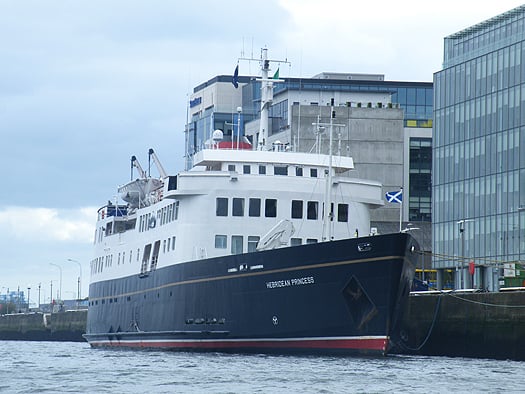
Operated by Hebridean Island Cruises, the 5-star vessel which is for only 50 guests, has a reputation for exceptional service, fine dining and has a crew of 38. Accommodation is in thirty spacious, elegant and well-appointed cabins. On Princess Deck is located 'The Isle of Arran' (for deck plans click HERE) Suite which at 340sq ft is the largest and most expensive. The suite comprises a large separate dayroom, a spacious bedroom and a luxuriously equipped Victorian-style marble bathroom. In addition 10 cabins are designed especially for the single traveller. She has appeared in 1st place in UltraTravel Magazine's "10 Coolest Cruises"
Normally the Glasgow registered vessel operates throughout the Scottish highlands and islands, to lochs and remote mainland locations made accessible due to her small size. It is in these same waters that the Hebridean Princess has sailed in another guise as the humble car-ferry Columba (photos) for Caledonian MacBrayne. She was built in 1964 by Hall Russell, Aberdeen and served in this role until 1989 when she was sold and underwent an extensive conversion for the ultra-luxury cruise market.
Her three-day stay to Dublin is part of a Grand Celtic Cruise which started in Cardiff and which will include a call to Carlingford Lough tomorrow, followed by Strangford Lough, Bangor, Ballycastle, the Scottish isles of Jura and Crinan before disembarking in Oban, her home-port. The 10-night cruise inclusive of three-gala dinners cost €4,195 per person for a double cabin and €6,292 per person in a single-cabin.
A decade before Columba was launched, the Royal Yacht Britannia (5,682 tonnes) was commissioned in 1954. She was laid-down two years previously at John Brown & Co. Ltd, Clydebank and the year before she entered service she was launched by HM Queen Elizabeth II. For over four decades she served as the royal yacht until decommissioned in 1997. Her final foreign mission was to convey the last governor of Hong Kong and Prince of Wales from the former colony after its handover to China. She is now permanently moored as an exhibition ship in Edinburgh (Leith) for details click HERE.
Earlier this month Queen Elizabeth's namesake the 2010 built Cunard Line cruiseship Queen Elizabeth made her maiden Irish call to Dublin followed by Cork (Cobh). To read more on Dublin call click HERE and for Cork (Cobh) click HERE.
- Dublin Bay
- Dublin Port
- Dublin Docklands
- Cobh
- Cruise Liners
- Ports and Shipping
- Queen Elizabeth II
- Cruiseships
- Cunard Line
- The Convention Centre
- Cruise news
- Hebridean Princess
- Hebridean Princess Cruises
- Columba ferry
- Caledonian MacBrayne
- Hall Russell Shipyard
- Royal Yacht Britannia
- Hong Kong handover
- Prince of Wales
- Royal Yacht




























